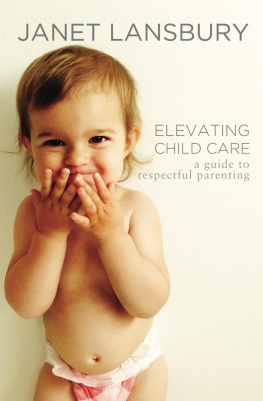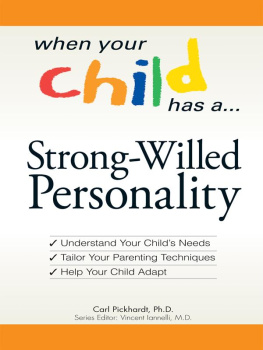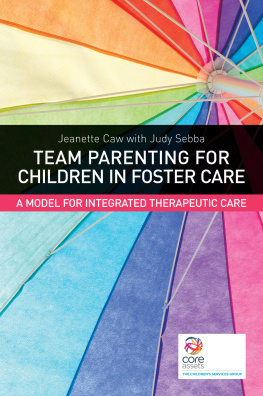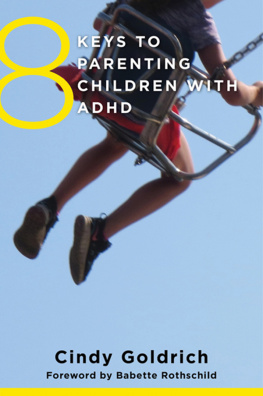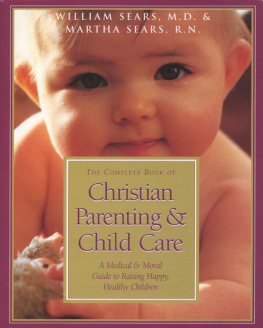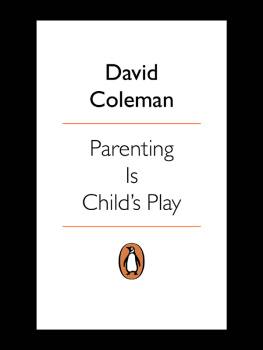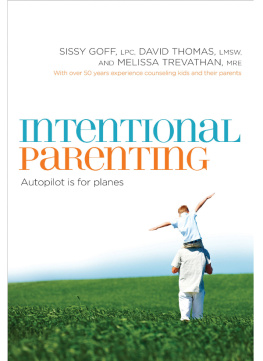Elevating Child Care
A Guide to Respectful Parenting
By Janet Lansbury
Elevating Child Care: A Guide to Respectful Parenting
Copyright (c) 2014 by Janet Lansbury
Published by JLML Press, 2014
All rights reserved. No part of this publication may be reproduced, distributed, or transmitted in any form or by any means, including photocopying, recording, or other electronic or mechanical methods, without the prior written permission of the publisher, except in the case of brief quotations embodied in critical reviews and certain other non-commercial uses permitted by copyright law.
For permission requests, please email the publisher, subject line: Elevating Child Care Permissions at
All identifying details, including names, have been changed except for those pertaining to the authors family members. Material contained in this book is available on the authors website. This book is not intended as a substitute for advice from a licensed professional.
~
Cover Photo and Design: Sara Prince
bonzochoochmushyandme.com
For more information about the author, please visit her website at: JanetLansbury.com
Table of Contents
INTRODUCTION
Finding a Passion for Parenting
P arenting is one of lifes most fulfilling experiences. It can also be exhausting, frustrating and utterly confounding.
The difficulties I faced as a new mother caught me off guard. I had looked forward to motherhood all my life and assumed that caring for a baby would happen naturally. Instead, I soon found that I had no clue.
My baby was adorable, yet never in my life had I felt so tired, lost, inept and disappointed in myself. The mothering instincts I had assumed would provide me with clarity and guidance never materialized. My life had become a monotonous succession of feeding, burping, diapering, entertaining, and soothing tears (lots and lots of tears, most of them my daughters). Though I combed desperately through stacks of popular parenting books, I found nothing that resonated.
At my wits end, I fatefully stumbled upon RIE (Resources for Infant Educators), the respectful approach to parenting founded by infant specialist and child care pioneer Magda Gerber. The approach made immediate sense to me, and I embraced it like a drowning victim with a life preserver.
Before long I had experienced a radical transformation in both perception and experience: first, by discovering my babys astounding natural abilities to learn without being taught, to develop motor and cognitive skills, communicate, face age appropriate struggles, initiate and direct independent play for extended periods and much more; then by realizing the tremendous energy and stress I had been wasting by struggling to entertain and second-guess my child.
Over the years, Magda became my dear friend and mentor, and her philosophy of child care my passion. I became a RIE parenting teacher, a lecturer at Early Childhood conferences, an active blogger with millions of readers worldwide, a personal parenting consultant, and an author.
This book is a collection of 30 popular and widely read articles from my website. They focus on some of the most common aspects of infant and toddler child care and how respectful parenting can be applied.
You will find Magdas name or a quote from her on nearly every page of this book. Everything I know and write about springs from her wisdom and my own experience with the hundreds of infants and toddlers who have come through my classes, and with my own three children (now 21, 17 and 12).
RIE parenting can be summed up as an awareness of our babys perspective. We perceive and acknowledge our infants to be unique, separate people. We enhance our awareness by observing them allowing them the bit of space they need to show us who they are and what they need.
RIE parenting also makes us more self-aware. Through our sensitive observations we learn not to jump to conclusions; for example, that our babies are bored , tired, cold, hungry, or want to hold the toy they seem to notice across the room.
We learn not to assume that grumbling or fussing means babies need to be propped to sitting, picked up, or rocked or bounced to sleep. We recognize that, like us, babies sometimes have feelings that they want to share and will work through them in their own way with our support.
We learn to differentiate our childrens signals from our own projections. We become more aware of the habits we create (like sitting babies up or jiggling them to sleep), habits that can then become our childs needs. These are artificially created needs rather than organic ones.
In short, RIE parenting asks us to use our minds as well as our instinct, to look and listen closely and carefully before we respond.
Sensitive observation proves to us that our babies are competent individuals with thoughts, wishes and needs of their own. Once we discover this truth theres no turning back. Then, like Alison Gopnik, one of several psychologists on the forefront of an exciting new wave of infant brain research, we might wonder: Why were we so wrong about babies for so long?
Practiced observers like Magda Gerber were not wrong. More than sixty years ago, she and her mentor, pediatrician Emmi Pikler, knew what Gopniks research is finally now proving: infants are born with phenomenal learning abilities, unique gifts, deep thoughts and emotions. Pikler and Gerber dismissed the notion of babies as cute blobs years ago, understood them as whole people deserving of our respect.
Magdas RIE approach can perhaps be best described as putting respect for babies into action. Heres how:
1. We communicate authentically. We speak in our authentic voices (though a bit more slowly with babies and toddlers), use real words and talk about real things, especially things that directly pertain to our babies and things that are happening now .
2. We encourage babies to build communication skills by asking them questions, affording them plenty of time to respond, always acknowledging their communication.
We invite babies to actively participate in care giving activities like diapering, bathing, meals and bedtime rituals and give them our full attention during these activities. This inclusion and focused attention nurtures our parent-child relationship, providing children the sense of security they need to be able to separate and engage in self-directed play.
We encourage uninterrupted, self-directed play by offering even the youngest infants free play opportunities, sensitively observing so as not to needlessly interrupt, and trusting that our childs play choices are enough . Perfect, actually.
We allow children to develop motor and cognitive skills naturally according to their innate timetables by offering them free play and movement opportunities in an enriching environment, rather than teaching, restricting or otherwise interfering with these organic processes. Our role in development is primarily trust .
We value intrinsic motivation and inner-directedness , so we acknowledge effort and take care not to over-praise. We trust our children to know themselves better than we know them, so we allow children to lead when they play and choose enrichment activities, rather than projecting our own interests.
We encourage children to express their emotions by openly accepting and acknowledging them.
We recognize that children need confident, empathetic leaders and clear boundaries but not shaming, distractions, punishments or time out.
We allow our children to problem solve, experience and learn from age-appropriate conflicts with our support.
We understand the power of our modeling and recognize that our children are learning from us through our every word and action about love, relationships, empathy, generosity, gratitude, patience, tolerance, kindness, honesty and respect. Most profoundly, theyre learning about themselves, their abilities, their worth, and their place in our hearts and in the world.
Next page
